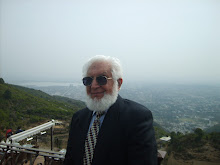Having understood the first verse, let us go to the second (Bear with me please these are important aspects and I cannot abbreviate more)
"Ma dzalla sahibukum wa ma ghawa"
"Your companion is neither astray nor being misled" (Yusufali)
"Your comrade erreth not, nor is deceived" (Pickthal)
"This fellow man of yours has not gone astray, nor is he deluded" (Asad)
"Tumhara rafeeq na bhatka hay na behka hay" (Maudoodi
The English translators of Maudoodi's "tafheem" mention gone 'astray' and 'deluded' also.
"Zdalla" indeed means going astray from the true path (not knowing it)
"Ghawa" is translated as 'deluded' actually also has same meaning (Dictionary) that is going astray, misguided or to misguide, lead astray, seduce, tempt lure etc. (Urdu speaking readers are familiar with (aghwaa). This also seems to suggest "going astray knowing that it is not the right path"
Anyway, "Deluded" is a 'loaded' word in as much as the physicians know its use. the understanding is not a problem that the prophet S. is referred to as "your companion" which indicates they know him well, he is not somebody from outside or unknown that is talking about things which appear to you to be 'out of their understanding'. So he is not gone astray but he is in complete possession of his senses.
Next:
"Wa ma yantiqu 'anilhawa, in huwa illa waHyun-yooHa"
"Nor does he say (aught) of (his own) desire. It is no less than ainspiration sent down to him"
(Yusuf Ali)
"Nor doth he speak of (his own) desire. It is naught save an inspiration that is inspired" (Pickthal)
"And neither does he speak of his own desire. That (which he conveys to you) is but a (divine) inspiration with which he is being inspired" (Asad)
The understanding is that the divine inspiration or revelation is not the word of the prophet S. but the Author is God himself. This is extremely important to grasp firmly as the meaning of "Wahi" about which I would have more to say but here I shall only mention from (Because it clarifies better) Maudoodi's "Tafheem-ul-Qur'an" translating to the best of my ability from Urdu.
He divides his (the prophet S.) speaking into three categories (my understanding, nt actual translation)
1. Speech related to the explanation of Qur'an, his instructions, his preaching etc. This was therefore essential to his mission so this speech must be devoid of error. He would therefore speak his own words but with God's inspiration(words of the prophet such as we also see in Hadeeth-e-Qudsi but the Maulana is implying all those things he would teach in his words (these can be termed as "Wahi-e-Khafi" but I am trying to avoid confusion here.)
2. Second, the speech with his companions on matters related to 'iqamat-e-deen' or making God's word supreme. Such would be occasions when he would discuss matters with the companions and may also ask (like at Badr confrontation) them their opinion. The companion reportedly asked him "is it God's guidance" for us or is it your own thinking"? And when he said it was his suggestion, the companion said "Ibeg to differ" and suggested to stop at another location which was strategically better for the Muslim Army. There were occasions where hisplan was corrected by God by a clear "Wahi" (If you will recall Sura "'Abasa").
3. third is 'the ordinary everyday' speech of a person like dealing with his family or visitors or on other 'mundane' matters. Though the prophet S. never even jokingly told a lie.
The speech that is clearly being differentiated here is what was being sent down as "revelation" which was not "his words" but God's exact words.
It is easy to understand here that if under any circumstances the prophet S. says something that is contrary to or likely to be misquoted in his mission, it would immediately be "corrected" (so to say) by the Angel Gabriel coming down with words from God, the "wahi", most of which is "recited" by us (the Qur'an) and is called therefore "recited wahi" as opposed to non-recited wahi (which includes almost evrything plus "hadeeth-e-Qudsi"-- the saying of the prophet S. beginning with, "God has told me......"
I'll stop here and wait till next week to see if I have made clear my point or it requires further clarification. So please feel free to criticise, or ask questions, and be objective. I am not good in summery writing and miss important point.
Saugoree means I was born or I hail from Saugor This is the way they spelt the name of that city of my birth during British days of India. Then I moved at 11 years of age to Kotla a village in the Panjab close to the Kashmir border where I finished my initial education and childhood going on to Lahore for further studies where I got BSc and MBBS and then left for NWFP where I spent 2 1/2 years, teaching in the new Medical School, and from there leaving for UK and then USA
Search This Blog
Subscribe to:
Post Comments (Atom)

3 comments:
I am thankful to you...as you provided the answer from Quran against the basis on which Salman Rushdie wrote "Satanic verses".
His whole novel is based on assumption that he was "deluded" by Satan as Gibrael, with false verses, which he retracted later.
Mystic bhai I am going to relate the story of Satanic Verses a bit later, keep reading. The Qur'an itself disproves it.
This is anonymous or oddthinker.I enjoy your thinking and writings about Islam.I am studying Torah and trying to to understand of mono-ethic religions (Abrahamic religions).I was stunned to see that Jewish religious studies have total dedication of Torah studies like Islamic madrasas called Beth midrash.And Muslims are blamed for teaching religion to their young ones.I remember the saying that oppression of people of one social order to rest of other social order causes a Major rebelion which surpasses religious or ethnic divides.
Post a Comment